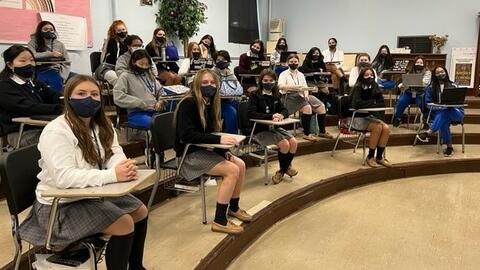Students who participated in the virtual 2021 Teen Hunger Summit explored food insecurity in the United States and learned how their volunteerism could help ease this pervasive problem.
The summit was sponsored by the Community FoodBank of New Jersey.
Representatives from the Academy of the Holy Angels and students from other area schools convened for in early December.
Twenty-two Angels, including freshmen, sophomores, juniors, and seniors, gathered to hear presentations from CFBNJ, Newark Beth Israel, Girls Helping Girls, City Green, Farmers Against Hunger, and more.
Workshops included Food Insecurity 101, Social Determinants of Health & Community Nutrition, Hunger as Health Issue, Urban Agriculture, and Food Waste & Gleaning.
Emma Joy covered the vital need for feminine hygiene products, which are not covered by SNAP (Food Stamps).
Linda Rivera and Heather Tedesco from the New Jersey Governor’s Office of Volunteerism discussed youth leadership and volunteerism.
Student participants were Cara Boyce of Old Tappan; Michele Carabuena of Ho-Ho-Kus; Cara Chang of Fort Lee; Karis Cho and Audrey Collins of Harrington Park; Sophia Chounoune and Caelyn Lindsay of Englewood; Olivia Costa and Marguerite Danahy of Oradell; Grace Costanza of Clifton; Caitlin Deiser of New Milford; Amalia Ferolie of Cresskill; Lilianna Garber of Mahwah; Nicole Grimpas of Closter; Eva Jurcevic of Hillsdale; Emily Kim of Englewood Cliffs; Olivia Leys of Tappan, New York; Alexandra Nicholas of Emerson; Valerie Rey of River Vale; Alexandra Valdez of Oakland; Zarin Veres Royal of Edgewater; and Maggie Yu of Tenafly.
The Angels discovered startling statistics, including the fact that approximately 38 million people in America are food insecure, and New Jersey ranks 45th in the nation for volunteerism.
Students were amazed to learn that many people have difficulty obtaining adequate food and hygiene products. In developing children, improper nutrition impacts brain development and academic performance.
In addition, girls who do not have ready access to feminine hygiene products may have gaps in their education because they cannot attend school for several days each month.
AHA’s summit attendees enjoyed learning about gleaning, which allows people to collect usable produce left behind after a harvest and bring it to those in need.
The Angels also heard about tangible ways they could get involved at local food banks.
“I liked that now I’m a little bit more aware of how I can get involved,” one student wrote on her post-summit survey.
Survey feedback also indicated that students wanted more discussion time and additional opportunities to interact with the presenters.
They also look forward to in-person summits in the future.
